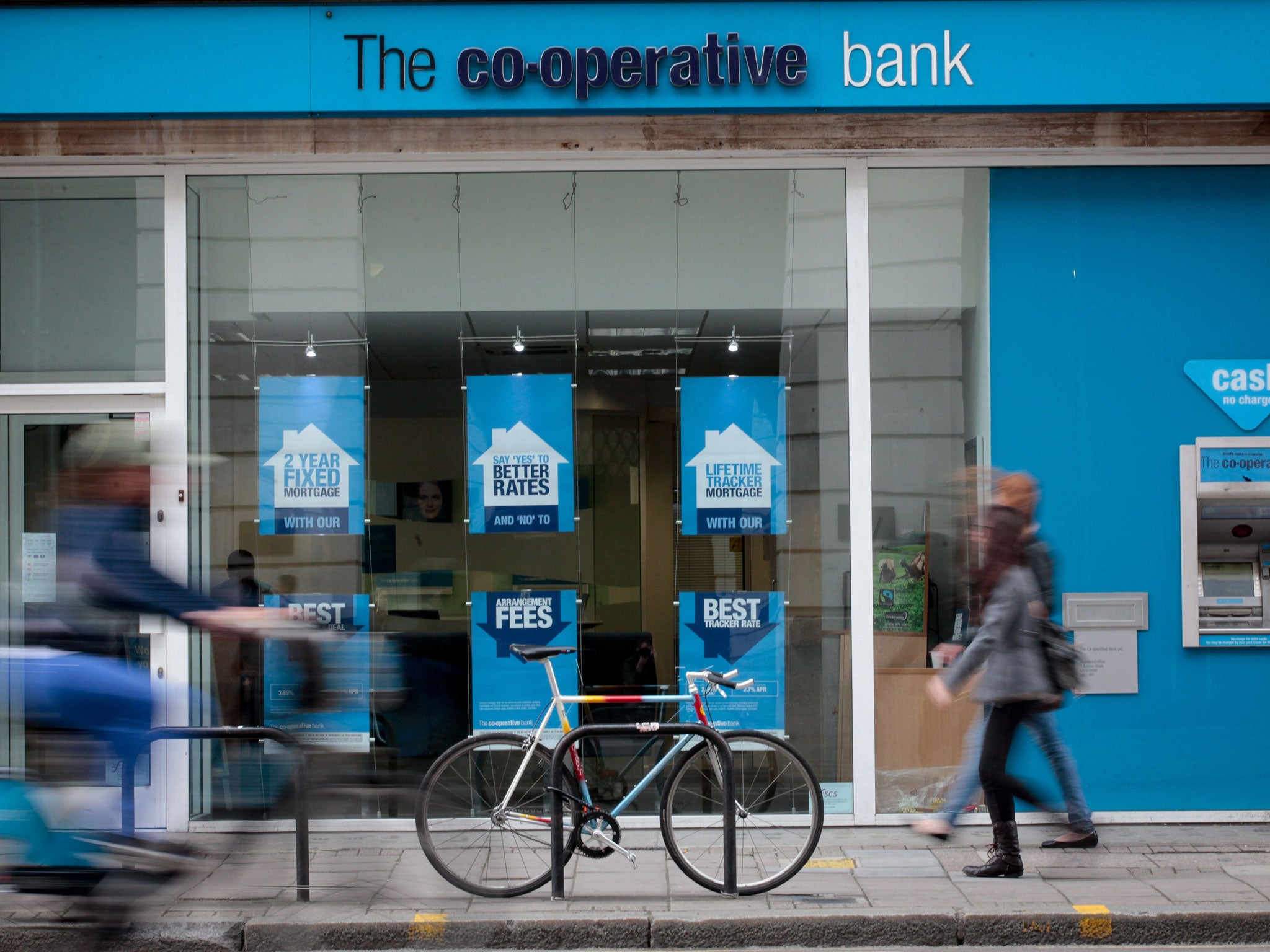Co-op bank: Mutual - the magic word that doesn't mean so much
Do customers really fare better with a model like the Co-op bank?


Your support helps us to tell the story
From reproductive rights to climate change to Big Tech, The Independent is on the ground when the story is developing. Whether it's investigating the financials of Elon Musk's pro-Trump PAC or producing our latest documentary, 'The A Word', which shines a light on the American women fighting for reproductive rights, we know how important it is to parse out the facts from the messaging.
At such a critical moment in US history, we need reporters on the ground. Your donation allows us to keep sending journalists to speak to both sides of the story.
The Independent is trusted by Americans across the entire political spectrum. And unlike many other quality news outlets, we choose not to lock Americans out of our reporting and analysis with paywalls. We believe quality journalism should be available to everyone, paid for by those who can afford it.
Your support makes all the difference.I once worked for the NatWest bank – in the days when was it was still independent and in the private sector – and managed to see at close quarters the priorities and corporate strategies of the top management.
These gentlemen (there were very few women on the top floor of 41 Lothbury) spent much of their time running through the accounts of potential acquisitions, including some of the larger building societies such as the Halifax, Leeds, Alliance and Leicester, as well as the old Trustees Savings Banks (which were in fact owned by no one in particular).
Sometimes NatWest’s finest would idly muse over the prospects of getting a mega-merger with one of the other big banks, maybe Lloyds, past the regulators. Options to sell off various chunks of the business or expand into new and risky territories such as the US were also the subject of lively debate.
It is fair to say that in all these deliberations I cannot recall the Co-operative bank figuring. It was, in fact, a mighty irrelevance so far as the financial system was concerned, and the sort of place where lefty students would open accounts to get back at Barclays for operating in South Africa (though I also boycotted Barclays for the same reason).
The Co-op was regarded on the same level as the Post Office run Girobank: a curiosity. The ironic thing about the Co-op bank now is that its approaching share issue may actually transform an also-ran mutual into a banking group that at least has the scope to challenge the bigger players.
Then as now, the Co-op bank’s main selling point is it supposedly “ethical” stance. I am quite prepared to believe that it doesn’t extend credit to, say, pornographers or tobacco firms, and steers clear of environmental vandals. However, I never believed that the “mutual” model was of much direct benefit to customers, and the Co-op bank’s charges and approach to customers, like those of the buildings societies, were not markedly different from the supposedly wicked main high-street clearers, as we called them.
Mutuality was a demonstrable irrelevance so far as the building societies were concerned, and the voting and participation in “society” activities was always pitifully meagre, as it is today for survivors such as the Nationwide. The only time there was a mass turn-out on a vote was when the Halifax, Leeds, Cheltenham and Gloucester, Bristol and West and all the rest put to their members the proposal to sell out or float the outfit, with the promise of windfall shares or cash. Centuries-old traditions of mutuality were swiftly ditched.
In the case of the Co-op bank the link with members is still more tenuous. Unlike the old building societies and friendly societies and life offices, the customers (for that is what they are) of the Co-op bank do not formally own their bank – it is instead owned by the Co-op Group, which has a corporate structure of a complexity that would make an offshore hedge fund blush. In other words, the management of the Co-op bank was far less accountable than that of, say, HSBC to its stakeholders.
Last, mutuality is not and never has been a defence against idiotic management and business failure. If it were, we would not have endured the Equitable Life scandal, the collapse of the Derbyshire, Dunfermline, Cheshire and Britannia societies (the latter of course ending up in the Co-op bank). Nor indeed, the Co-op bank’s own disaster. The Co-op was actually poised to be the worst of the failures, as small investors, essentially no different to depositors and numbering many pensioners, were about to have a chunk of their savings taken from them – unprecedented in modern times. The arch-capitalist hedge funds actually saved them from such a fate. The Co-op Bank is lucky to survive in any form; it should make the most of what the stock market has to offer it.
The beautiful (numbers) game
Much excitement about the third quarter GDP growth figures, due out later this week. Since the financial crash they have had something of the quality of a much-loved sporting fixture, such as any of the matches on England’s perilous path to Brazil. Well, among media and City types at any rate.
I’m happy to join in the pointless speculation. Looking at most of the “leading indicators”, such as business and consumer confidence, there seems little reason to doubt the recovery will continue and pick up pace. Much of this remains a “catch-up” from postponed spending during the long recession. The big picture remains one of sluggish performance born of uncompetitive fundamentals. A bit like the England football team, really.
Join our commenting forum
Join thought-provoking conversations, follow other Independent readers and see their replies
Comments